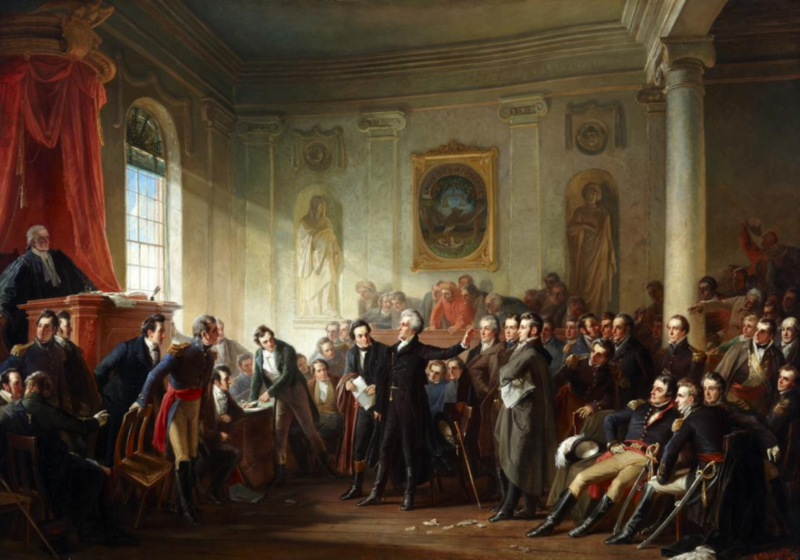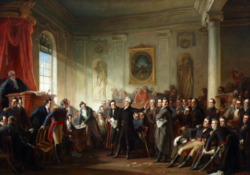Dominick A. Hall
In 1813, Dominick Augustin Hall was appointed the presiding judge of the newly established Supreme Court of Louisiana.

Courtesy of Gilcrease Museum.
Andrew Jackson before Judge Hall by Christian Schussele.
Dominick Augustin Hall was the first presiding judge, or chief justice, of the Louisiana Supreme Court following statehood in 1812. He was born in 1765 in South Carolina and began practicing law in Charleston in 1786. Very little is known about his private life.
On July 1, 1801, Thomas Jefferson appointed Hall federal judge to the US Circuit Court for the Fifth Circuit, which was created by the Judiciary Act of 1801 and consisted of the judicial districts of Georgia, North Carolina, and South Carolina. The US Senate confirmed his appointment on January 26, 1802, but the court was abolished after the repeal on July 1, 1802, of the Judiciary Act of 1801. Jefferson again nominated him on November 30, 1804, to a new federal judgeship created for the US District Court for the Territory of Orleans. Hall’s knowledge of maritime law and ability to read French made him well qualified for the job. With statehood, that court was abolished and became the US District Court, District of Louisiana. On May 27, 1812, James Madison appointed Hall judge of the US District Court for the District of Louisiana. Hall and his colleague George Mathews attended the first session of the court on March 1, 1813; the legislature had delayed confirmation of the third judge, Pierre Derbigny, until March 9. Hall quickly became dissatisfied with the position and tendered his resignation in May, but he stayed to complete the term, which ended on July 5, 1813. He was reappointed judge of the US District Court for the District of Louisiana by President Madison and confirmed by the Senate on June 1, 1813. He remained in that position until his death on December 19, 1820.
Hall’s fellow jurists recognized his judicial ability, although he claimed that a lack of knowledge of the state’s civil law hindered him as a judge on the Louisiana Supreme Court. It has also been speculated that he preferred the independent nature of work as a solo federal judge to the collaboration required of the three-person supreme court bench.
In 1815 Hall gained notoriety as the federal judge who fined Gen. Andrew Jackson $1,000 for his refusal to recognize a writ of habeas corpus and for imprisoning a judge (Hall himself) during Jackson’s declaration of martial law in New Orleans, which was in effect from December 1814 to March 1815 (the weeks following the Battle of New Orleans).
Hall helped to establish the Episcopal Church in New Orleans and was a member of the first vestry of Christ Church, New Orleans.
